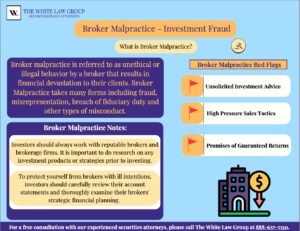Are you Concerned about Broker Malpractice?
Broker malpractice is a serious issue that can have devastating consequences for investors. When brokers engage in unethical or illegal behavior, their clients can suffer significant financial losses. There are key elements to broker malpractice and different ways in which investors can protect themselves. If you think you’ve suffered losses from broker malpractice, The White Law Group may be able to help by filing a FINRA arbitration claim.
What is Broker Malpractice?
The term broker malpractice refers to unethical or illegal behavior by a broker that results in financial devastation to their clients. Broker Malpractice takes many forms including investment fraud, misrepresentation, breach of fiduciary duty and other types of misconduct. If you suspect that your broker is engaging in malpractice, it’s important to take action to protect your rights as an investor. This may involve filing a complaint with the appropriate resolution agency such as the Financial Industry Regulatory Authority (FINRA) or seeking legal representation to hold your broker accountable for their actions. Some broker malpractice forms include:
Mismanaging client accounts, such as making unauthorized trades or failing to follow a client’s instructions. Another form could include failing to disclose conflicts of interest or other material facts that could impact a client’s investment decisions. In these situations, it is important to stay informed and proceed with caution as these activities occur, since you could be a victim of broker malpractice.
Cautionary Signs of Investment Fraud
 If you notice anything out of the ordinary when first meeting with a broker or financial advisor it is important to take those red flags into consideration before proceeding. Some of those red flags include:
If you notice anything out of the ordinary when first meeting with a broker or financial advisor it is important to take those red flags into consideration before proceeding. Some of those red flags include:
- Unsolicited Investment Advice – This is often a common red flag for broker malpractice. This occurs when a broker offers investment advice or recommends a specific investment without being asked by their client. This is often a sign demonstrating that your broker is more interested in generating commissions or fees rather than acting in their clients best interest. It’s important to note that brokers have a legal obligation to recommend investments that are suitable for their client based on their personal circumstances and characteristics like age, income, and risk tolerance. Unsolicited investment advice can be a sign that a broker is not fulfilling these obligations and could be engaging in unethical or illegal behavior.
- High Pressure Sales Tactics – High pressure sales tactics are another common red flag for Broker Malpractice. This occurs when a broker uses aggressive or manipulative tactics to convince a potential client to invest in a particular security or product. These tactics can take many forms, such as making unrealistic promises about returns, using scare tactics to create a sense of urgency, or insisting that an investment is a “Sure thing”. Brokers are required to provide clients with accurate and complete information about the recommended investments. If they are unable to follow through with their obligation, that is considered broker malpractice.
- Promises of Guaranteed Returns – Promises of guaranteed returns are a major red flag of broker malpractice. This primarily occurs when a broker makes promises or guarantees about the returns that a particular investment will generate. This is a sign that your broker is engaging in fraudulent or unethical behavior, as no investment can truly guarantee a specific rate of return. Keep in mind that some cases involving a promise of guaranteed returns could be associated with Ponzi Scheme or other fraudulent investment schemes.
By remaining vigilant and seeking out accurate information, investors can help protect themselves against the risks of broker malpractice.
Examples of Broker Malpractice
On April 6, 2023 William Winchester III was barred from the Financial Regulatory Authority for reportedly borrowing more than $850,000 from three of his customers without notifying his member firm or obtaining the firm’s approval, according to the AWC. Winchester ultimately agreed to the settlement without admitting to or denying Finra’s findings.
In March of 2023, the former head of Wells Fargo Bank’s retail banking division, Carrie L. Tolstedt, 63, of Scottsdale, Arizona, agreed to plead guilty to obstructing a government examination into the bank’s widespread sales practices misconduct, which included opening millions of unauthorized accounts and other products, federal authorities announced today. Wells Fargo in 2020 acknowledged the widespread sales practices misconduct within the Community Bank and paid a $3 billion penalty in connection with agreements reached with the United States Attorneys’ Offices for the Central District of California and the Western District of North Carolina, the Justice Department’s Civil Division, and the Securities and Exchange Commission. According to FINRA, Wells Fargo allegedly failed to adequately monitor its brokers’ sales practices and failed to respond to red flags indicating that brokers were recommending unsuitable investments to their clients.
High-Risk, Unsuitable Investments
In another example, a Wells Fargo broker recommended that a retiree invest a substantial portion of their savings in a single, high-risk, and illiquid security. The broker did not adequately disclose the risks associated with the investment, and the retiree ultimately lost a significant portion of their savings as a result of the malpractice.
These examples illustrate the serious consequences of broker malpractice and the importance of established supervision by brokerage firms. Investors who have been harmed may be able to recover those losses through legal action. It’s imperative that investors do their research on their brokers and brokerage firms prior to investing to avoid fraud and financial devastation.
Hiring a Securites Fraud Attorney
Investors who have been harmed by broker malpractice may have legal options available to them, but it can be difficult to navigate the complex legal landscape. Securities fraud attorneys can help with investors who have been harmed by broker malpractice in a number of ways. First they can provide legal advice and representation to help investors recover their losses though litigation or arbitration. Securities fraud attorneys can also guide investors in understanding their rights and legal options. They can look deeply into the investors account statements, trading history, and other relevant documents to determine whether broker malpractice has occurred, and advise on the best course of action. The final important action to note is that securities fraud attorneys can assist with recovering financial losses. This includes compensation for lost investment opportunities, lost profits, and other damages resulting from broker malpractice.
The White Law Group’s FINRA arbitration attorneys have handled over 700 FINRA arbitration claims involving unauthorized trading, unsuitable investments, fraud, negligence, churning/excessive trading, and improper use of margin.
The White Law Group, LLC is a national securities fraud, securities arbitration, investor protection, and securities regulation/compliance law firm with offices in Chicago, Illinois and Seattle, Washington. For a free consultation with a securities attorney, please call the firm’s office at 888-637-5510
For information on The White Law Group and its representation of investors in broker negligence claims, visit http://whitesecuritieslaw.com.
Tags: broker malpractice, investment fraud Last modified: July 27, 2023








